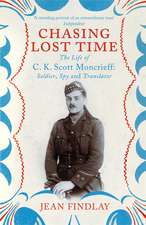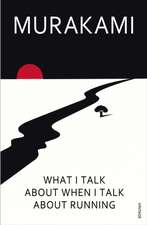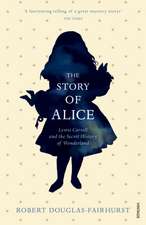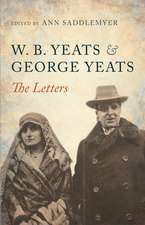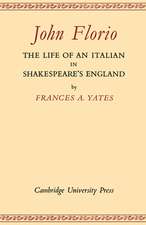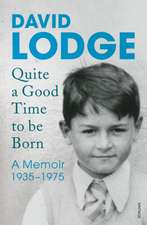Oscar Wilde
Autor Barbara Belforden Limba Engleză Paperback – 31 aug 2001
| Toate formatele și edițiile | Preț | Express |
|---|---|---|
| Paperback (2) | 81.78 lei 6-8 săpt. | |
| Random House – 30 sep 2000 | 144.43 lei 3-5 săpt. | |
| Bloomsbury Publishing – 31 aug 2001 | 81.78 lei 6-8 săpt. |
Preț: 81.78 lei
Preț vechi: 119.91 lei
-32% Nou
Puncte Express: 123
Preț estimativ în valută:
15.65€ • 16.28$ • 12.92£
15.65€ • 16.28$ • 12.92£
Carte tipărită la comandă
Livrare economică 14-28 aprilie
Preluare comenzi: 021 569.72.76
Specificații
ISBN-13: 9780747553250
ISBN-10: 0747553254
Pagini: 416
Dimensiuni: 129 x 26 x 198 mm
Greutate: 0.35 kg
Editura: Bloomsbury Publishing
ISBN-10: 0747553254
Pagini: 416
Dimensiuni: 129 x 26 x 198 mm
Greutate: 0.35 kg
Editura: Bloomsbury Publishing
Notă biografică
Barbara Belford's other biographies of Victorian literary figures include Bram Stoker: A Biography of the Author of Dracula and Violet: The Story of the Irrepressible Violet Hunt and Her Circle of Lovers and Friends--Ford Madox Ford, H. G. Wells, Somerset Maugham, and Henry James. She lives in New York City.
From the Hardcover edition.
From the Hardcover edition.
Extras
Chapter 1
Lord of Life
There is nothing like youth. The middle-aged are mortgaged to Life. The old are in Life's lumber-room. But youth is the Lord of Life. Youth has a kingdom waiting for it. --A Woman of No Importance
Oscar Wilde's first public performance was in the drawing room of his Dublin home on Merrion Square, where the two-year-old entertained guests by reciting his name--Oscar Fingal O'Flahertie Wills Wilde--over and over. Savoring the vowels, trilling the fricatives, he gulped for air, chanting away, faster and faster like an intelligent windup toy, precocious, brazen, and insecure, until applause quieted him. Wilde was later to assert: "Everyone is good until they learn to talk." His mother called him a genius, and he agreed but others misunderstood. "The public is wonderfully tolerant," Wilde said. "It forgives everything except genius."
He mocked himself and society and made the world laugh at destiny. "My name has two O's, two F's and two W's," he later observed. "A name which is destined to be in everybody's mouth must not be too long; besides it becomes so expensive in the advertisement." Following his birth, Wilde's mother wrote a friend: "He is to be called Oscar Fingal Wilde. Is not that grand, misty and Ossianic?" "Names are everything," says Lord Henry Wotton in The Picture of Dorian Gray, and Oscar, who believed that his cradle was rocked by fate, had more than his share.
"I envy those men who become mythological while still living," W. B. Yeats once remarked to Wilde, who replied, "I think a man should invent his own myth." That he did. The name Oscar was an auspicious beginning, for it honored the son of Osin of the Gaelic epics, who was born in the Land of Eternal Youth. Like his namesake, Wilde loved youth, even more than art. "The soul is born old but grows young," he wrote. "That is the comedy of life. And the body is born young and grows old. That is life's tragedy." Fingal, Gaelic for "fair-haired stranger," goes back to Viking times and identifies a coastal region between the Liffey and Boyne Rivers.
With the addition of O'Flahertie, recalling the Galway heritage of his father, whose ancestors had married into the clan of the pre-Norman kings of West Connacht, Oscar was linked to an ancient Celtic family. His father had been given the name Wills as a tribute to a leading Roscommon family that included the playwright William Gorman Wills. In fact, Wilde's father dedicated his first book, Madeira, to Wills, a notable eccentric who filled his room with abandoned animals he rescued. The name Wills was passed on to Oscar, who used it when it suited his fancy.
His mother called him Oscar, with an imperious accented a; his relatives preferred "Ossie." At public school he was "Grey-Crow," and at Oxford "Hosky" or occasionally "O'Flighty." In London, the American artist James Whistler dubbed him "Oscarino." Henry James referred to him as "Hoscar." Identity begins--and sometimes ends--with nicknames.
"How ridiculous of you to suppose that anyone, least of all my dear mother, would christen me 'plain Oscar,' " Wilde later said. "When one is unknown, a number of Christian names are useful, perhaps needful. As one becomes famous, one sheds some of them...I started as Oscar Fingal O'Flahertie Wills Wilde. All but two of the five names have already been thrown overboard. Soon I shall discard another and be known simply as 'The Wilde' or 'The Oscar.' "
Brilliance and daring created "The Oscar," which led to C.3.3., his prison cell number, and finally to Sebastian Melmoth, his nom de plume in exile, when, without an identity, Wilde was deprived of his currency in everyday life. Before his death, he decided that he wanted to be known as "the infamous St. Oscar of Oxford, Poet and Martyr." How far had he traveled from those jovial evenings when grown-ups applauded his recitations!
His parents were brilliant and eccentric--bohemian characters often manipulated by biographers into the cause of Wilde's errant sexuality. Far more than the sum of their excesses, they lived in the next century while other mid-Victorians still grappled with industrialism. William Wilde became a notable eye-and-ear surgeon with a still-resonating legacy of scientific and folkloric research. He fathered at least three illegitimate children before marriage and was accused of rape after marriage. His wife, an inflammatory poet of nationalism and innovative translator, became Dublin's most gossiped about hostess--known for her decadent bejeweled dresses and bawdy talk.
"Man is least himself when he talks in his own person," Wilde wrote in The Critic as Artist. "Give him a mask, and he will tell you the truth." In the art of masks, Wilde's mother was a skillful teacher. Jane Francesca Elgee was born on December 21, 1821. Births were not registered then, but she gave this date in 1888, when she applied for financial aid from the Royal Literary Fund and it was in her interest to be older. At other times she was five years younger. In A Woman of No Importance, Lord Illingworth speaks for her when he says, "One should never trust a woman who tells one her real age. A woman who would tell one that would tell one anything." Oscar started to grow backwards before he reached twenty-four, and by the time of his trials, when he was forty-one, he admitted to thirty-nine.
As a young woman, Oscar's mother was slender and stately, with glistening black hair, a perfect model for a statue of civic virtue. Although she ballooned into an ungainly, large-boned woman in her later years, she never lost the ability to enter a room with a savoir faire that silenced conversation. Outfitted in multilayered skirts over numerous petticoats, her face masked by a black-lace mantilla, she looked every inch a donna of the aristocracy, which she claimed as a putative ancestor of Dante. To enhance this subterfuge, she may have Italianized her middle name from Frances to Francesca. Oscar learned that reality can be improved and that life should be a series of beautiful lies--maternal verities that he turned into a philosophy of life.
Her Irish background was Protestant and, on her mother's side, prosperous; all in all respectable, but Jane would have preferred Dante. Her father, Charles, an attorney, descended from a bricklayer with roots in the Northumberland area of Durham; her mother, Sarah Kingsbury, was the daughter of the vicar of Kildare and the granddaughter of the archdeacon of Wexford. Her maternal great-grandfather, Dr. Thomas Kingsbury, a friend of Jonathan Swift, was president of the Royal College of Physicians.
By far the most impressive relative was a maternal uncle by marriage, an eccentric, melancholy character who died before Oscar was born. His name was Charles Maturin, and he was a clergyman and the author of Melmoth the Wanderer, a classic gothic tale of sin and redemption that was published in 1820, two years after Mary Shelley's Frankenstein. Maturin was a dandy whom Oscar would have adored. A contemporary recalled how he "was the first in the quadrille--the last to depart. The ballroom was his temple of inspiration and worship." When he entertained, the shutters were closed and candles lighted even on sunny days, an atmospheric touch Oscar's mother imitated. Maturin liked to write surrounded by people and placed a red wafer on his forehead to indicate he was working; if a conversation intrigued him, he sealed his mouth shut with a homemade paste. It impressed Wilde that his great-uncle was respected by Baudelaire and that Balzac included Maturin with Goethe, Molière, and Byron as a genius of European letters, even writing a sequel to his novel called Melmoth Reconcilie.
Jane Elgee's father died when she was three. Within six years, her older sister and brother made advantageous marriages and left home. She lived with her mother and came of age at 34 Leeson Street, in a middle-class neighborhood located south of Dublin's Grand Canal. A lonely girl, she found solace in reading and teaching herself foreign languages. Fortunately, her widowed mother had family money to provide home tutoring.
In her twenties, she was drawn into politics through the Young Irelander poets, who had aligned themselves with Charles Gavan Duffy's Nation. Between 1846 and 1848, she published poetry there, under the nom de plume of John Fanshawe Ellis, later signing herself "Speranza," Italian for hope. (Her notepaper bore the motto Fidanza, Speranza, Costanza.) Speranza saw herself as "the acknowledged voice in poetry of all the people of Ireland."
In 1849, while Duffy was arrested for sedition and awaiting trial, she wrote two editorials ("The House of Destiny" and "Jacta Alea Est," or "The Die Is Cast"), which declared--a bit prematurely--that Ireland was at war with England. She admitted authorship of "Jacta Alea Est," but Duffy was tried anyway. In court she may--or may not--have stood up in the gallery and proclaimed: "I, and I alone, am the culprit, if culprit there be." Four juries failed to convict Duffy. The Nation was suppressed, and the wounded Young Irelanders dispersed. Speranza's fleeting arc from unknown poet to political celebrity ended, but she retained her pseudonym.
Unmarried at twenty-eight--and with no burning desire to find a husband--Speranza decided to translate books and poetry. Some accounts claim she mastered twelve languages, but the record shows fluency in Italian, French, and German; her translations of Russian, Turkish, Spanish, and Portuguese poetry for The Nation demonstrated an ability to look words up in a dictionary. Her first major translation (she would do six from 1849 to 1863) was Johannes Wilhelm Meinhold's sadomasochistic seventeenth-century fantasy, Sidonia the Sorceress. The poet Edmund Gosse observed how "this German romance did not begin to exist until an Irishwoman revealed it to a select English circle."
The novel's heroine, Sidonia von Bork, Abbess of the Convent of Marienfliess, tortures geese, whips young men, and dances on coffins. She fascinated Dante Gabriel Rossetti as well as his Pre-Raphaelite colleague Edward Burne-Jones, who painted her portrait in 1860. Speranza said she did the translation only for money and refused to have her name on the title page. Even so, Sidonia established her reputation, and her next project was Alphonse de Lamartine's Pictures of the First French Revolution.
Wilde said that Lady Duff-Gordon's translation of Meinhold's The Amber Witch and his mother's Sidonia were his "favourite romantic reading when a boy." Certainly Sidonia and Melmoth were literary legacies worthy of emulation. In both novels, paintings compete as characters, not an original concept but one Wilde used ingeniously in The Portrait of Mr. W.H. and ominously in The Picture of Dorian Gray. In Melmoth, the portrait of the ancestor who bargained with the devil to live 150 years without aging is hidden in an old lumber room, similar to the nursery where Dorian Gray conceals his picture when it becomes grotesquely disfigured.
Speranza lived the intellectual and unromantic life of a spinster; she translated French and German books, wrote poetry, attended lectures and concerts, and cared for her ailing mother. She would have been a commonplace figure had she not embarked on a secret correspondence with a young man met during a trip to Scotland in 1847. They wrote to each other for fifteen years. Only fifty of her letters survive, and his identity remains a mystery. She was clearly infatuated with this Scotsman--her letters are candid about love and marriage but lacking the intimacy of the postal flirtations between Ellen Terry and George Bernard Shaw or George Sand and Gustave Flaubert.
In one letter she describes her ideal mate as "a Baronet of ú5,000 a year with the Athenian's soul and your good heart." She flirts a bit: "I don't care for a friendship unless fringed with--not quite love perhaps--but something that is always on the point of becoming so," and shares her fantasies: "In love I like to feel myself a slave--the difficulty is to find anyone capable of ruling me. I love them when I feel their power." Lord Henry similarly observes in Dorian Gray: "I am afraid that women appreciate cruelty, downright cruelty, more than anything else...We have emancipated them, but they remain slaves looking for their masters all the same. They love being dominated."
Jane shocked guests at her salons with offhand comments about sin being the only thing worth living for, but such talk was a mask, a calculated performance. Her recent biographer Joy Melville maintains that her "sense of morality was strong, and not being a woman with a strong sexual nature she was not tempted to stray." Except in letters. After corresponding for three years, her Scotsman wrote that he planned to marry. "Do forgive me if I am not very enthusiastic," she wrote him in 1850. "I shall have to wait ten years now I suppose before your ardour is sufficiently cooled down to find a rational opinion on any point literary or psychological." And she bitterly noted, "I hate men in love, the heart holds but one at a time."
From the Hardcover edition.
Lord of Life
There is nothing like youth. The middle-aged are mortgaged to Life. The old are in Life's lumber-room. But youth is the Lord of Life. Youth has a kingdom waiting for it. --A Woman of No Importance
Oscar Wilde's first public performance was in the drawing room of his Dublin home on Merrion Square, where the two-year-old entertained guests by reciting his name--Oscar Fingal O'Flahertie Wills Wilde--over and over. Savoring the vowels, trilling the fricatives, he gulped for air, chanting away, faster and faster like an intelligent windup toy, precocious, brazen, and insecure, until applause quieted him. Wilde was later to assert: "Everyone is good until they learn to talk." His mother called him a genius, and he agreed but others misunderstood. "The public is wonderfully tolerant," Wilde said. "It forgives everything except genius."
He mocked himself and society and made the world laugh at destiny. "My name has two O's, two F's and two W's," he later observed. "A name which is destined to be in everybody's mouth must not be too long; besides it becomes so expensive in the advertisement." Following his birth, Wilde's mother wrote a friend: "He is to be called Oscar Fingal Wilde. Is not that grand, misty and Ossianic?" "Names are everything," says Lord Henry Wotton in The Picture of Dorian Gray, and Oscar, who believed that his cradle was rocked by fate, had more than his share.
"I envy those men who become mythological while still living," W. B. Yeats once remarked to Wilde, who replied, "I think a man should invent his own myth." That he did. The name Oscar was an auspicious beginning, for it honored the son of Osin of the Gaelic epics, who was born in the Land of Eternal Youth. Like his namesake, Wilde loved youth, even more than art. "The soul is born old but grows young," he wrote. "That is the comedy of life. And the body is born young and grows old. That is life's tragedy." Fingal, Gaelic for "fair-haired stranger," goes back to Viking times and identifies a coastal region between the Liffey and Boyne Rivers.
With the addition of O'Flahertie, recalling the Galway heritage of his father, whose ancestors had married into the clan of the pre-Norman kings of West Connacht, Oscar was linked to an ancient Celtic family. His father had been given the name Wills as a tribute to a leading Roscommon family that included the playwright William Gorman Wills. In fact, Wilde's father dedicated his first book, Madeira, to Wills, a notable eccentric who filled his room with abandoned animals he rescued. The name Wills was passed on to Oscar, who used it when it suited his fancy.
His mother called him Oscar, with an imperious accented a; his relatives preferred "Ossie." At public school he was "Grey-Crow," and at Oxford "Hosky" or occasionally "O'Flighty." In London, the American artist James Whistler dubbed him "Oscarino." Henry James referred to him as "Hoscar." Identity begins--and sometimes ends--with nicknames.
"How ridiculous of you to suppose that anyone, least of all my dear mother, would christen me 'plain Oscar,' " Wilde later said. "When one is unknown, a number of Christian names are useful, perhaps needful. As one becomes famous, one sheds some of them...I started as Oscar Fingal O'Flahertie Wills Wilde. All but two of the five names have already been thrown overboard. Soon I shall discard another and be known simply as 'The Wilde' or 'The Oscar.' "
Brilliance and daring created "The Oscar," which led to C.3.3., his prison cell number, and finally to Sebastian Melmoth, his nom de plume in exile, when, without an identity, Wilde was deprived of his currency in everyday life. Before his death, he decided that he wanted to be known as "the infamous St. Oscar of Oxford, Poet and Martyr." How far had he traveled from those jovial evenings when grown-ups applauded his recitations!
His parents were brilliant and eccentric--bohemian characters often manipulated by biographers into the cause of Wilde's errant sexuality. Far more than the sum of their excesses, they lived in the next century while other mid-Victorians still grappled with industrialism. William Wilde became a notable eye-and-ear surgeon with a still-resonating legacy of scientific and folkloric research. He fathered at least three illegitimate children before marriage and was accused of rape after marriage. His wife, an inflammatory poet of nationalism and innovative translator, became Dublin's most gossiped about hostess--known for her decadent bejeweled dresses and bawdy talk.
"Man is least himself when he talks in his own person," Wilde wrote in The Critic as Artist. "Give him a mask, and he will tell you the truth." In the art of masks, Wilde's mother was a skillful teacher. Jane Francesca Elgee was born on December 21, 1821. Births were not registered then, but she gave this date in 1888, when she applied for financial aid from the Royal Literary Fund and it was in her interest to be older. At other times she was five years younger. In A Woman of No Importance, Lord Illingworth speaks for her when he says, "One should never trust a woman who tells one her real age. A woman who would tell one that would tell one anything." Oscar started to grow backwards before he reached twenty-four, and by the time of his trials, when he was forty-one, he admitted to thirty-nine.
As a young woman, Oscar's mother was slender and stately, with glistening black hair, a perfect model for a statue of civic virtue. Although she ballooned into an ungainly, large-boned woman in her later years, she never lost the ability to enter a room with a savoir faire that silenced conversation. Outfitted in multilayered skirts over numerous petticoats, her face masked by a black-lace mantilla, she looked every inch a donna of the aristocracy, which she claimed as a putative ancestor of Dante. To enhance this subterfuge, she may have Italianized her middle name from Frances to Francesca. Oscar learned that reality can be improved and that life should be a series of beautiful lies--maternal verities that he turned into a philosophy of life.
Her Irish background was Protestant and, on her mother's side, prosperous; all in all respectable, but Jane would have preferred Dante. Her father, Charles, an attorney, descended from a bricklayer with roots in the Northumberland area of Durham; her mother, Sarah Kingsbury, was the daughter of the vicar of Kildare and the granddaughter of the archdeacon of Wexford. Her maternal great-grandfather, Dr. Thomas Kingsbury, a friend of Jonathan Swift, was president of the Royal College of Physicians.
By far the most impressive relative was a maternal uncle by marriage, an eccentric, melancholy character who died before Oscar was born. His name was Charles Maturin, and he was a clergyman and the author of Melmoth the Wanderer, a classic gothic tale of sin and redemption that was published in 1820, two years after Mary Shelley's Frankenstein. Maturin was a dandy whom Oscar would have adored. A contemporary recalled how he "was the first in the quadrille--the last to depart. The ballroom was his temple of inspiration and worship." When he entertained, the shutters were closed and candles lighted even on sunny days, an atmospheric touch Oscar's mother imitated. Maturin liked to write surrounded by people and placed a red wafer on his forehead to indicate he was working; if a conversation intrigued him, he sealed his mouth shut with a homemade paste. It impressed Wilde that his great-uncle was respected by Baudelaire and that Balzac included Maturin with Goethe, Molière, and Byron as a genius of European letters, even writing a sequel to his novel called Melmoth Reconcilie.
Jane Elgee's father died when she was three. Within six years, her older sister and brother made advantageous marriages and left home. She lived with her mother and came of age at 34 Leeson Street, in a middle-class neighborhood located south of Dublin's Grand Canal. A lonely girl, she found solace in reading and teaching herself foreign languages. Fortunately, her widowed mother had family money to provide home tutoring.
In her twenties, she was drawn into politics through the Young Irelander poets, who had aligned themselves with Charles Gavan Duffy's Nation. Between 1846 and 1848, she published poetry there, under the nom de plume of John Fanshawe Ellis, later signing herself "Speranza," Italian for hope. (Her notepaper bore the motto Fidanza, Speranza, Costanza.) Speranza saw herself as "the acknowledged voice in poetry of all the people of Ireland."
In 1849, while Duffy was arrested for sedition and awaiting trial, she wrote two editorials ("The House of Destiny" and "Jacta Alea Est," or "The Die Is Cast"), which declared--a bit prematurely--that Ireland was at war with England. She admitted authorship of "Jacta Alea Est," but Duffy was tried anyway. In court she may--or may not--have stood up in the gallery and proclaimed: "I, and I alone, am the culprit, if culprit there be." Four juries failed to convict Duffy. The Nation was suppressed, and the wounded Young Irelanders dispersed. Speranza's fleeting arc from unknown poet to political celebrity ended, but she retained her pseudonym.
Unmarried at twenty-eight--and with no burning desire to find a husband--Speranza decided to translate books and poetry. Some accounts claim she mastered twelve languages, but the record shows fluency in Italian, French, and German; her translations of Russian, Turkish, Spanish, and Portuguese poetry for The Nation demonstrated an ability to look words up in a dictionary. Her first major translation (she would do six from 1849 to 1863) was Johannes Wilhelm Meinhold's sadomasochistic seventeenth-century fantasy, Sidonia the Sorceress. The poet Edmund Gosse observed how "this German romance did not begin to exist until an Irishwoman revealed it to a select English circle."
The novel's heroine, Sidonia von Bork, Abbess of the Convent of Marienfliess, tortures geese, whips young men, and dances on coffins. She fascinated Dante Gabriel Rossetti as well as his Pre-Raphaelite colleague Edward Burne-Jones, who painted her portrait in 1860. Speranza said she did the translation only for money and refused to have her name on the title page. Even so, Sidonia established her reputation, and her next project was Alphonse de Lamartine's Pictures of the First French Revolution.
Wilde said that Lady Duff-Gordon's translation of Meinhold's The Amber Witch and his mother's Sidonia were his "favourite romantic reading when a boy." Certainly Sidonia and Melmoth were literary legacies worthy of emulation. In both novels, paintings compete as characters, not an original concept but one Wilde used ingeniously in The Portrait of Mr. W.H. and ominously in The Picture of Dorian Gray. In Melmoth, the portrait of the ancestor who bargained with the devil to live 150 years without aging is hidden in an old lumber room, similar to the nursery where Dorian Gray conceals his picture when it becomes grotesquely disfigured.
Speranza lived the intellectual and unromantic life of a spinster; she translated French and German books, wrote poetry, attended lectures and concerts, and cared for her ailing mother. She would have been a commonplace figure had she not embarked on a secret correspondence with a young man met during a trip to Scotland in 1847. They wrote to each other for fifteen years. Only fifty of her letters survive, and his identity remains a mystery. She was clearly infatuated with this Scotsman--her letters are candid about love and marriage but lacking the intimacy of the postal flirtations between Ellen Terry and George Bernard Shaw or George Sand and Gustave Flaubert.
In one letter she describes her ideal mate as "a Baronet of ú5,000 a year with the Athenian's soul and your good heart." She flirts a bit: "I don't care for a friendship unless fringed with--not quite love perhaps--but something that is always on the point of becoming so," and shares her fantasies: "In love I like to feel myself a slave--the difficulty is to find anyone capable of ruling me. I love them when I feel their power." Lord Henry similarly observes in Dorian Gray: "I am afraid that women appreciate cruelty, downright cruelty, more than anything else...We have emancipated them, but they remain slaves looking for their masters all the same. They love being dominated."
Jane shocked guests at her salons with offhand comments about sin being the only thing worth living for, but such talk was a mask, a calculated performance. Her recent biographer Joy Melville maintains that her "sense of morality was strong, and not being a woman with a strong sexual nature she was not tempted to stray." Except in letters. After corresponding for three years, her Scotsman wrote that he planned to marry. "Do forgive me if I am not very enthusiastic," she wrote him in 1850. "I shall have to wait ten years now I suppose before your ardour is sufficiently cooled down to find a rational opinion on any point literary or psychological." And she bitterly noted, "I hate men in love, the heart holds but one at a time."
From the Hardcover edition.
Recenzii
Praise for Barbara Belford's Bram Stoker: A Biography of the Author of Dracula
"A superb biography...It completely alters our understanding of the classic tale."
--Michael Sheldon, Baltimore Sun
"Intelligent, well-written and always interesting...showcasing some of the most fascinating characters ever to gather on the same stage."
--Margot Peters, The New York Times Book Review
"One of the delights of Belford's work is that it is studded with rapidly drawn and vivid portraits."
--Penelope Mesic, Chicago Tribune
"Belford achieved a goal Count Dracula appreciates. She has restored Bram Stoker to life in the ordinary world."
--Jules Wagman, St. Louis Post-Dispatch
"Organized and written with formidable intelligence, her interpretation of Dracula [is] threaded skillfully into the narrative of Stoker's life."
--Ian McIntyre, London Times
From the Hardcover edition.
"A superb biography...It completely alters our understanding of the classic tale."
--Michael Sheldon, Baltimore Sun
"Intelligent, well-written and always interesting...showcasing some of the most fascinating characters ever to gather on the same stage."
--Margot Peters, The New York Times Book Review
"One of the delights of Belford's work is that it is studded with rapidly drawn and vivid portraits."
--Penelope Mesic, Chicago Tribune
"Belford achieved a goal Count Dracula appreciates. She has restored Bram Stoker to life in the ordinary world."
--Jules Wagman, St. Louis Post-Dispatch
"Organized and written with formidable intelligence, her interpretation of Dracula [is] threaded skillfully into the narrative of Stoker's life."
--Ian McIntyre, London Times
From the Hardcover edition.

